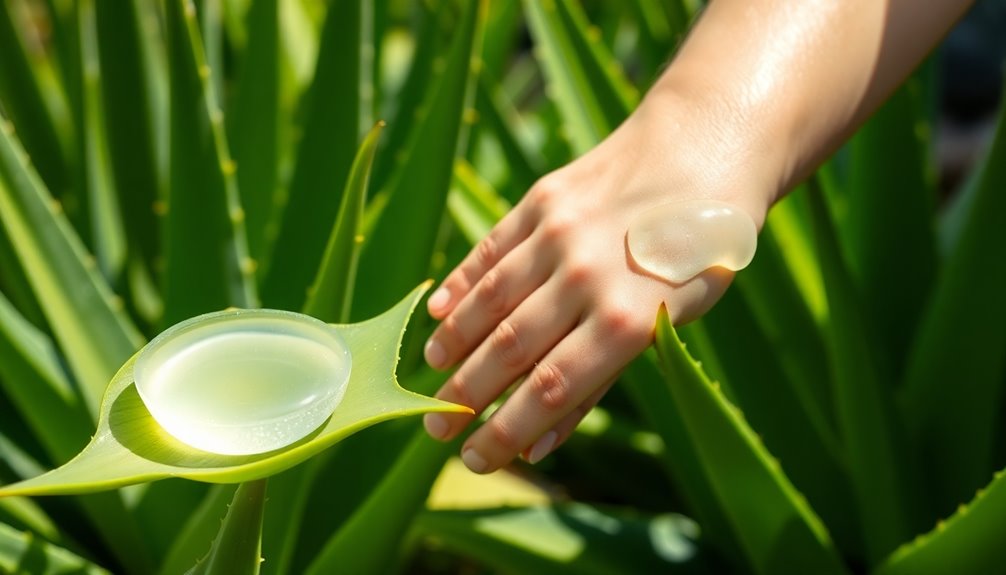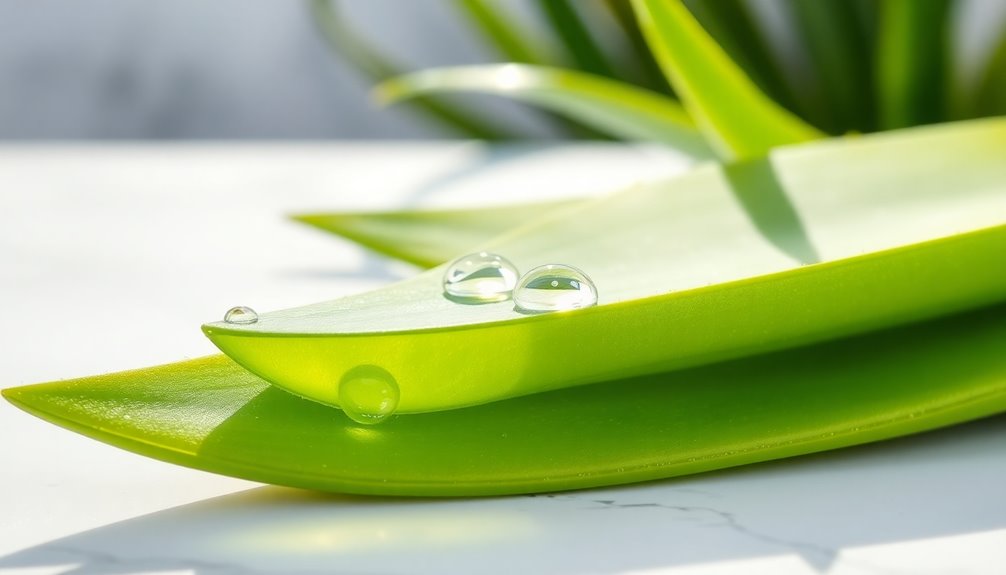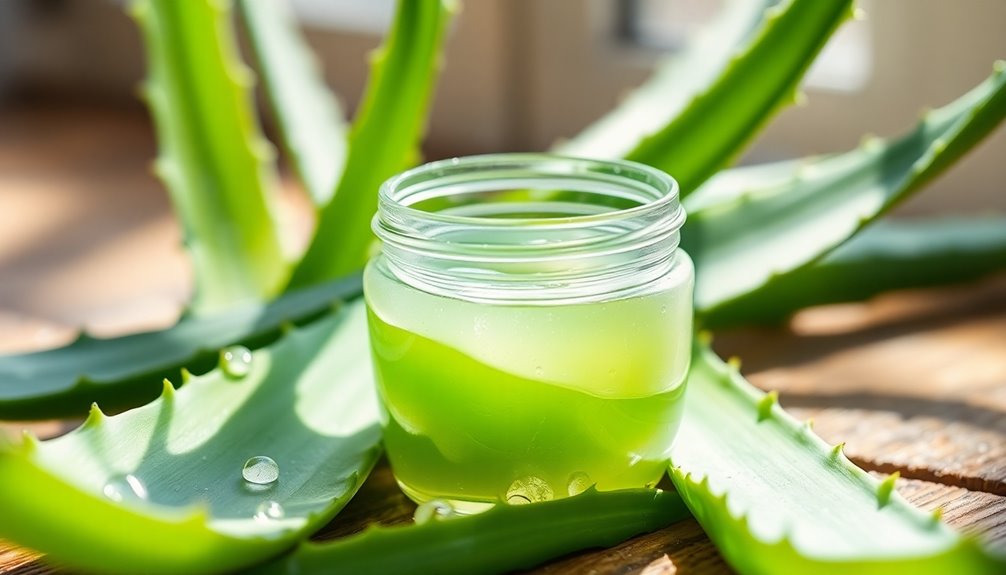Aloe vera gel is a game-changer for your skin! It hydrates deeply, soothes sunburn, and fights acne with its anti-inflammatory and antimicrobial properties. Packed with vitamins and antioxidants, it protects against premature aging while improving your skin's texture and elasticity. Whether you use it as a moisturizer or a spot treatment, its natural healing powers can transform your routine. Keep exploring to uncover even more amazing benefits and tips for using aloe vera gel effectively!
Key Takeaways
- Aloe vera gel is a natural moisturizer, perfect for hydrating dry and sensitive skin with its high water content and nourishing properties.
- Its anti-inflammatory benefits soothe irritation and redness, making it ideal for treating sunburns and acne-prone skin.
- Rich in antioxidants like vitamins C and E, aloe vera gel protects against environmental stressors and helps prevent premature aging.
- The gel promotes collagen synthesis, enhancing skin elasticity and texture for a youthful, plump appearance.
- Combining aloe vera with other natural ingredients creates customized skincare solutions, elevating your routine for enhanced self-care.
What Is Aloe Vera Gel?

Aloe vera gel is a remarkable natural substance derived from the inner leaf of the aloe plant. This clear, jelly-like gel is over 99% water and packed with essential nutrients, including 20 minerals, 12 vitamins, and 200 phytonutrients.
For centuries, it's been celebrated for its healing properties, making it a staple in many skincare routines. With its anti-inflammatory properties, aloe vera gel soothes and calms irritated skin, providing deep hydration and nourishment.
It easily penetrates the skin, making it effective for various skin concerns, from dryness to acne. Additionally, the antioxidants in aloe vera gel, like vitamins C and E, protect your skin from environmental stressors, promoting overall skin health with natural ingredients.
Does Aloe Vera Gel Work?

You might wonder if aloe vera gel really works, and the answer is a resounding yes.
Historical use alongside scientific studies backs its ability to hydrate skin and accelerate healing.
With its proven benefits, aloe vera gel can be a powerful addition to your skincare routine.
Historical and Scientific Support
For centuries, cultures around the world have turned to aloe vera gel for its remarkable skin care and healing properties. This age-old remedy has gained modern scientific support, proving its effectiveness in improving skin hydration and accelerating wound healing.
Research highlights the anti-inflammatory benefits for the skin, helping to reduce redness and irritation. Aloe vera gel also boasts antimicrobial properties, effectively targeting acne-causing bacteria and promoting clearer skin for those with acne-prone conditions.
Additionally, its rich antioxidant content, including vitamins C and E, protects your skin from environmental stressors, which can lead to premature aging. Furthermore, studies have shown that essential oils for skin health can complement aloe vera gel by enhancing its soothing and healing effects.
With its long-standing history and scientific backing, aloe vera gel continues to be a trusted ally in your skin care routine.
Skin Healing and Hydration
Known for its historical significance, aloe vera gel proves to be a powerful ally in skin healing and hydration. Its hydrating properties make it an excellent natural moisturizer for dry and sensitive skin. Scientific studies show that aloe vera can accelerate healing, considerably reducing recovery time for cuts and burns. Plus, its ability to reduce inflammation helps soothe redness and irritation from conditions like sunburn and acne. Additionally, incorporating aloe vera with antibacterial properties can further enhance its effectiveness against acne-causing bacteria.
| Benefit | Description |
|---|---|
| Healing | Accelerates wound healing and reduces recovery time. |
| Hydration | Acts as a natural moisturizer for sensitive skin. |
| Antibacterial Properties | Targets acne-causing bacteria for a clearer complexion. |
Incorporating aloe vera into your routine can enhance your skin's health and appearance.
Benefits of Aloe Vera Gel

Aloe vera gel is your go-to for natural hydration, making it perfect for keeping dry skin moisturized.
It also works wonders for treating acne and soothing sunburns, providing relief when you need it most.
Natural Hydration Powerhouse
When you're looking for a natural way to keep your skin hydrated, aloe vera gel stands out as a powerful option. Composed of over 90% water, it acts as a natural humectant, drawing moisture into your skin. This gel is rich in vitamins A, C, and E, providing essential antioxidants while promoting healthy skin. Its unique blend of 20 minerals and 18 amino acids nourishes and improves skin health. Plus, the anti-inflammatory properties help soothe irritated skin, making it perfect for conditions like eczema. Regular use considerably improves skin texture and elasticity, ensuring a plump and youthful appearance.
| Benefits | Description | Key Ingredients |
|---|---|---|
| Natural Humectant | Draws moisture into the skin | Over 90% water |
| Anti-inflammatory | Soothes irritated skin | Vitamins A, C, E |
| Improves Skin | Enhances texture and elasticity | 20 minerals, 18 amino acids |
Acne Treatment Wonder
Maintaining hydration is key for healthy skin, but if you're battling acne, you need more than just moisture.
Aloe vera gel is your go-to solution, offering a multitude of benefits that help combat breakouts and promote a clearer complexion.
- Targets acne-causing bacteria
- Anti-inflammatory properties reduce redness
- Rich in salicylic acid to unclog pores
- Hydrating properties without clogging pores
Sunburn Relief Solution
After a day in the sun, you might find yourself dealing with the uncomfortable sting of sunburn, but aloe vera gel comes to the rescue. This incredible natural remedy is perfect for soothing sunburns and provides instant relief to inflamed skin.
Its anti-inflammatory properties help reduce redness and swelling, allowing your skin to recover faster. To maximize the benefits, apply a thin layer of pure aloe vera gel to the affected areas.
Rich in antioxidants and vitamins, it not only hydrates but also supports the healing process, preventing peeling and dryness. Additionally, using aloe vera gel can help maintain skin hydration as you recover, ensuring your skin stays supple and healthy.
With aloe vera, you can accelerate your skin's recovery and restore its natural moisture balance, making it your go-to solution for sunburn relief.
Side Effects of Aloe Vera Gel

Although aloe vera gel is widely regarded as safe for most people, it's crucial to be aware of potential side effects. Here are some key points to reflect on:
- Allergic reactions may occur, leading to redness or itching.
- Always perform a patch test before using, especially if you have sensitive skin.
- Avoid applying aloe vera gel to open wounds without consulting a healthcare provider.
- Pregnant or breastfeeding women should steer clear of oral use due to possible medication interactions.
While aloe vera gel boasts anti-inflammatory and antibacterial properties, it's vital to recognize that not all skin types will react the same way.
Being cautious can help you enjoy its benefits without unwanted side effects.
How to Use Aloe Vera Gel

When you want to harness the benefits of aloe vera gel, applying it correctly is key to maximizing its soothing and healing properties.
To soothe sunburn, apply a generous layer of aloe gel directly to the affected area for instant relief.
For daily moisturizing, use a thin layer of aloe on clean, damp skin to hydrate without clogging pores.
If you're dealing with acne, dab a small amount of aloe vera gel directly onto blemishes to reduce inflammation and combat bacteria.
You can also mix aloe gel with other natural ingredients like honey or tea tree oil for customized face masks targeting specific concerns.
Always remember to perform a patch test before extensive use, especially if you have sensitive skin.
Top Trendy Products That Contain Aloe Vera Gel

As you explore the world of skincare, you'll find that many trendy products now showcase aloe vera gel as a star ingredient, thanks to its impressive hydrating and soothing benefits.
Whether you have sensitive skin or you're looking for clean beauty options, these products are designed to enhance your skin health.
Check out these popular items:
- Aloe Vera Gel Moisturizers: Infused with botanical extracts for deep hydration.
- Sun Care Products: Offering relief and accelerated healing for sunburned skin.
- Face Masks: Targeting inflammation and redness with calming aloe vera gel.
- Clean Beauty Brands: Focusing on natural formulations free from harmful additives.
With these products, you can enjoy the nourishing effects of aloe vera gel while keeping your skin well-hydrated. Additionally, incorporating mindfulness techniques into your skincare routine can further elevate your self-care experience.
The Science Behind Aloe Vera's Healing Properties

Aloe vera's remarkable healing properties stem from its complex composition, which includes over 200 phytonutrients, 20 minerals, and 18 amino acids. These components work together to provide significant benefits for your skin health. Scientific studies indicate that aloe vera can promote collagen synthesis and has strong anti-inflammatory effects, making it ideal for treating wounds and reducing irritation. Additionally, its ability to enhance skin hydration and elasticity contributes to a more youthful appearance.
| Component | Benefits | Function |
|---|---|---|
| Phytonutrients | Healing properties | Aid in skin repair |
| Antioxidants | Skin protection | Combat oxidative stress |
| Amino Acids | Moisturizing | Hydrate and nourish skin |
| Salicylic Acid | Acne treatment | Unclogs pores and reduces blemishes |
Utilizing aloe vera can truly transform your skincare routine!
Frequently Asked Questions
What Happens if You Apply Aloe Vera Gel Everyday?
If you apply aloe vera gel every day, you'll notice a significant boost in your skin's hydration.
It helps soothe inflammation and reduce redness, making it perfect for sensitive or acne-prone skin.
You'll also find that minor wounds and sunburns heal faster with regular use.
Over time, you might see a brighter complexion and fewer dark spots.
Plus, its antioxidants can help protect your skin from damage and maintain its elasticity.
What Does Aloe Vera Do to a Woman's Body?
Imagine your skin soaking in a rejuvenating, cool gel, instantly revitalizing and hydrating your body.
Aloe vera works wonders for you by deeply moisturizing your skin, keeping it soft and elastic. It calms irritations, reduces redness, and fights acne with its antibacterial properties. In addition to its soothing effects, aloe vera promotes healing and can help fade scars left by previous breakouts. Many people have turned to this natural remedy as part of their skincare routine, particularly for its impressive aloe vera benefits for acne. Regular application can lead to clearer skin, making it a popular choice for those seeking a gentle yet effective solution.
Plus, the antioxidants protect you from environmental stressors and promote youthful radiance. Regular use can even help fade dark spots, giving you an even, glowing complexion that feels amazing.
What Happens When We Apply Aloe Vera Gel on Our Face Overnight?
When you apply aloe vera gel on your face overnight, you'll notice a boost in hydration and softness by morning. Its natural humectant properties draw moisture into your skin, while its anti-inflammatory effects soothe redness and irritation.
You might also see improved skin texture and clarity, as aloe works to fade dark spots and promote an even tone. Plus, its antioxidants help repair and regenerate skin, minimizing fine lines and wrinkles.
What Does Aloe Vera Do to Your Head?
When you apply aloe vera to your scalp, it soothes irritation and reduces inflammation, making it ideal for sensitive skin.
You'll notice an improvement in dryness and flakiness, so it's great for combating dandruff.
Aloe vera nourishes hair follicles with its vitamins and minerals, promoting healthier hair growth while minimizing hair loss.
Plus, its antibacterial and antifungal properties help keep your scalp healthy, preventing infections and enhancing your hair's shine and texture.
Conclusion
Incorporating aloe vera gel into your skincare routine isn't just another trend; it's a game-changer for your skin. You might think it's too simple to be effective, but this powerhouse ingredient offers incredible hydration, healing, and soothing properties. Whether you're battling sunburn or just want to boost your skin's glow, aloe vera has got your back. So, don't underestimate this natural remedy—your skin will thank you for embracing its amazing benefits!
Cindy thoroughly researches juicing trends, techniques, and recipes to provide readers with practical advice and inspiration. Her writing style is accessible, engaging, and designed to make complex concepts easy to understand. Cindy’s dedication to promoting the advantages of juicing shines through her work, empowering readers to make positive changes in their lives through the simple act of juicing.
















